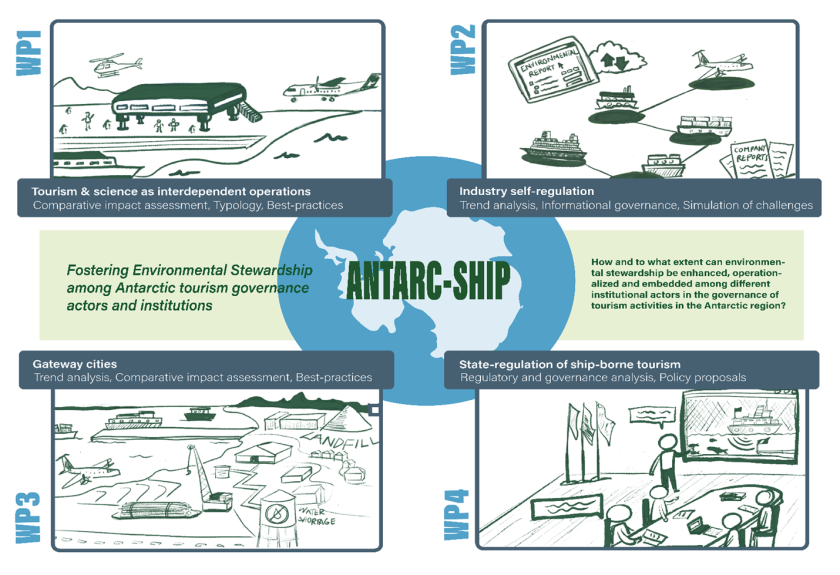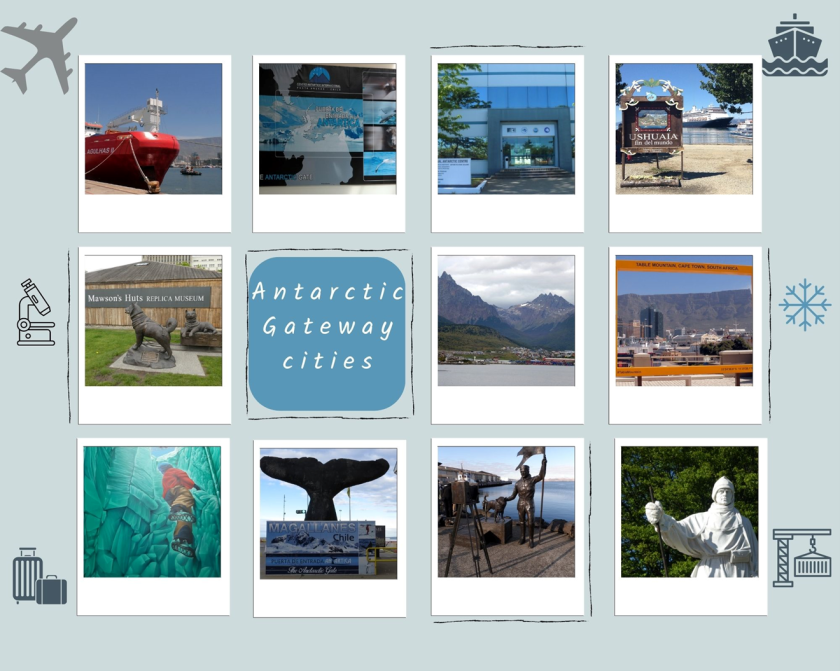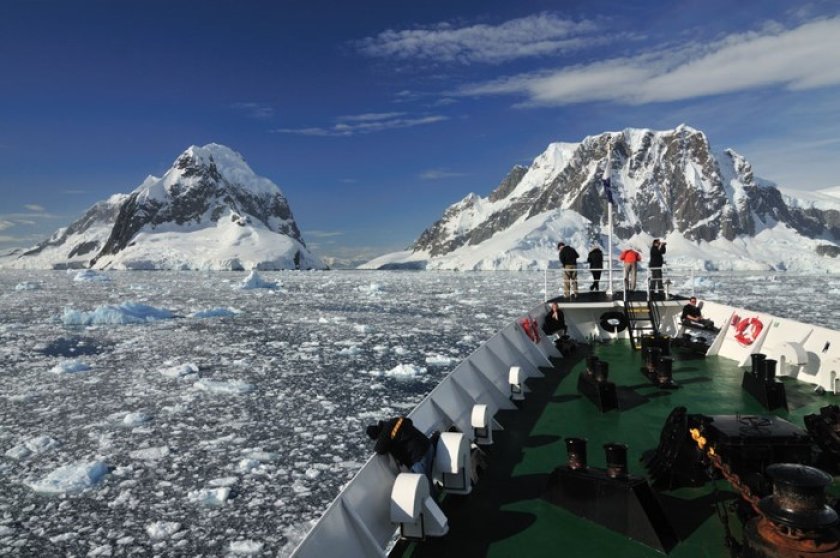
ANTARC-SHIP Environmental Stewardship in Antarctic Tourism
The aim of the ANTARC-SHIP project is to examine to what extent, and how, environmental stewardship can be assessed, enhanced, and facilitated among the different actors and institutions involved in the operation and governance of Antarctic tourism. Discover, in detail, the various work packages of this project.
ANTARC-SHIP Project Workpackages

Tourism and Science Interdependency (WP1)
Tourism and science constitute the main non-extractive activities in Antarctica and are connected in diverse ways. Both activities overlap spatially and temporally, exert similar pressures on the ecosystems, share common practices in the field, and have a common goal of fostering environmental stewardship. Even though environmental stewardship is not new in the Antarctic context, understanding how interrelated practices of tourism and science contribute to the conservation and protection of Antarctica has never been explicitly addressed in research. In this work package we ask how and to what extent do the interrelationships of tourism and science contribute to fostering environmental stewardship?
The work consist of three steps:
- Conducting a comparative impact assessment of tourism and science operations to understand their environmental pressures and societal benefits.
- Developing a typology of the interrelationships between tourism and science operations.
- Assessing the contribution of tourism and science practices to environmental stewardship
We expect that our results will result in series of best-practices leading to a strengthening of environmental stewardship, as well as specific policy recommendations and alternatives to inform decision-making in the Antarctic Treaty System.
The research under WP1 will be conducted mainly by Dr. Daniela Cajiao (Wageningen University & Research), together with Dr. Machiel Lamers, Dr. Bas Amelung (Wageningen University & Research), Prof. Javier Benayas and Dr. Pablo Tejedo (Autonomous University of Madrid).
Self-regulation (WP2)
Antarctica is an unusual tourism destination. Due to the complex governance structure, the (environmental) performance of tourism in Antarctica is predominantly regulated by the industry itself. The majority of tour operators are organized under the International Association of Antarctica Tour Operators (IAATO), the self-governing body responsible for all tourism-related matters in Antarctica. This self-regulatory system has been functioning well (Student et al., 2016), but is under increasing pressure from internal challenges, such as the diversification of operators, as well as external challenges, such as the sprawl of landing sites (Carey, 2020) and the increasing attention for the industry’s high carbon emissions (Farreny, et al. 2011). The meaning, scope and effectiveness of self-regulation have become fuzzy.
Using the concept of environmental stewardship, this WP examines the self-regulation of the Antarctic tourism industry. It investigates what possible dimensions/aspects there are to the scope and meaning of self-regulation, how stakeholders interpret and shape current self-regulation, and what stakeholders think can and cannot be expected from self-regulation in the future. The WP focuses specifically on two key issues: spatial implications of tourism and carbon emissions. The findings will inform decision-making by state regulators and industry alike on the future role of self-regulation within the overall regulatory context of Antarctic tourism.
The research under WP2 will be conducted mainly by PhD candidate Anisja Obermann (Wageningen University & Research), supervised by Dr. Machiel Lamers and Dr. Bas Amelung (Wageningen University & Research).

Antarctic tourism impacts in the Gateway cities (WP3)
The Antarctic gateway cities play an important role in facilitating access to and from Antarctica, and as a result, these urban centres have developed connections with the southern polar region that go beyond their position of ‘entrepôts’ for Antarctic activities. While travelers benefit from the polar connections at the gateways, the interactions between the tourism industry and local communities are often overlooked, particularly when considering the associated impacts arising from these cities’ role as facilitators and modulators of Antarctic tourism activities.
Against this background, this work package asks:
-To what extent are the gateways currently equipped for assuming the role of environmental stewards of Antarctica and embracing the responsibilities of an Antarctic Custodial city?
-To what extent do Antarctic tourism developments affect the local communities at the gateways?
-Can Antarctic tourism influence environmental stewardship in the gateways’ communities, and vice versa?
We aim to advance the concept of Antarctic custodial cities through the lens of environmental stewardship. Drawing on previous collaborations and scholarship, we will bring Antarctic gateway stakeholders together to develop a suite of indicators for Antarctic tourism impacts and will then develop indicator dashboards and policy recommendations that can potentially be applied in other contexts.
The research under WP3 will be conducted mainly by Dr. Gabriela Roldan (University of Canterbury, New Zealand), supervised by Dr. Daniela Liggett (University of Canterbury, New Zealand) and Dr. Emma Stewart (Lincoln University, New Zealand).
State and intergovernmental regulation of Antarctic shipborne tourism (WP4)
Antarctic shipborne tourism is regulated by different state and intergovernmental legal regimes. The research will be aimed at providing clarity on, and identifying gaps in, state and intergovernmental regulations (e.g. IMO-based instruments, Antarctic Treaty System tools, regional arrangements on port state control) on the environmental impacts and risks of Antarctic shipborne tourism, with special attention to underwater noise. Based on this analysis, we will develop recommendations to enhance and operationalize the regulatory framework pursuant to the notion of environmental stewardship. These recommendations will be policy-oriented, developed in close consultation with stakeholders and submitted to policymakers.
The research under WP4 will be conducted mainly by Dr. Andrey Todorov (Utrecht University), supervised by Dr. Erik J. Molenaar (Utrecht University) and Dr. Machiel Lamers (Wageningen University).
